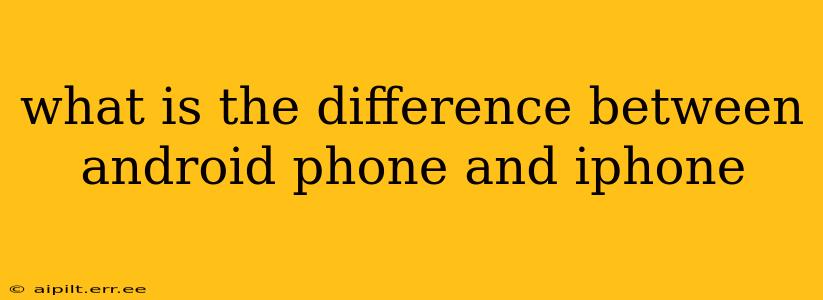What's the Difference Between Android Phones and iPhones? A Deep Dive
The smartphone market is dominated by two major players: Android and iOS (Apple's iPhone operating system). While both offer similar functionalities like calling, texting, and browsing the internet, significant differences exist beneath the surface. Choosing between an Android phone and an iPhone often boils down to personal preference, but understanding these key distinctions can help you make an informed decision.
Operating System (OS): The Core Difference
This is the fundamental difference. Android, developed by Google, is an open-source operating system, meaning its code is publicly available and can be modified by various manufacturers. This allows for a wide range of customization options and a vast array of device choices at different price points. iOS, on the other hand, is Apple's proprietary operating system, closed-source and only used on Apple devices. This results in a more tightly controlled ecosystem with a consistent user experience across all iPhones.
Customization and Flexibility: Android's Open-Source Advantage
Android's open-source nature allows for extensive customization. Users can personalize virtually every aspect of their phone, from widgets and launchers to app icons and notification settings. They have access to a broader range of hardware options from different manufacturers like Samsung, Google, OnePlus, and more, each offering unique design features and specifications. This flexibility is a major draw for users who value personalization and choice.
App Ecosystem: A Tale of Two App Stores
Both Android (Google Play Store) and iOS (Apple App Store) offer millions of apps. While many popular apps are available on both platforms, some exclusive apps exist for each. Generally, the app approval process is stricter on the App Store, resulting in a potentially more curated and secure app experience. However, the Google Play Store offers a wider selection of apps and often releases apps earlier.
Cost: A Wide Range vs. Premium Pricing
Android phones are available across a vast spectrum of prices, from budget-friendly options to high-end flagships. This caters to a wide range of budgets and needs. iPhones, on the other hand, tend to be positioned at the higher end of the market, offering premium features and build quality but at a premium price.
Hardware and Software Integration: Apple's Seamless Ecosystem
Apple designs both its hardware and software, resulting in a highly integrated and seamless user experience. Features like AirDrop (for easy file sharing between Apple devices), iCloud (for seamless data synchronization), and the tight integration with other Apple services like Apple Music and iMessage create a cohesive ecosystem that is highly appealing to users already within the Apple sphere. Android, while increasingly well-integrated, doesn't offer the same level of seamless synergy across all devices.
Security and Updates: A Balancing Act
Apple is often praised for its strong security features and consistent software updates for its devices. This ensures iPhones remain up-to-date with the latest security patches and feature improvements for longer periods. Android's open nature can sometimes lead to fragmentation, with updates sometimes varying widely depending on the manufacturer and the specific device. However, Google has been working to improve the situation with its Pixel devices and Project Treble, aiming for faster and more consistent updates.
How Much Does an iPhone Cost Compared to an Android Phone?
The cost difference between iPhones and Android phones is significant. Entry-level Android phones are far more affordable than the cheapest iPhone model. High-end Android phones can also be expensive, rivaling iPhone prices, but the overall price range for Android is considerably broader.
Which is Better for Gaming?
Both Android and iOS offer excellent gaming experiences. Android often has a wider selection of games due to its open nature, and some Android phones offer more powerful hardware than some iPhone models. However, iOS typically has a better reputation for optimized game performance and a smoother, more polished gameplay experience. The best platform for gaming largely depends on individual game preferences and the specific device used.
Ultimately, the "better" choice depends on individual priorities and preferences. If you value customization, flexibility, and a wider range of price options, Android is likely a better fit. If you prefer a streamlined, tightly integrated ecosystem with strong security and consistent updates, an iPhone might be more suitable. Carefully consider your needs and preferences before making your decision.
